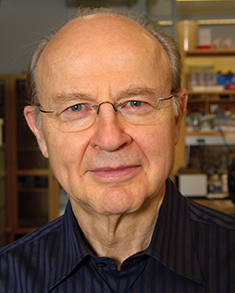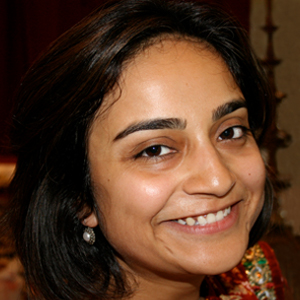Roeder ‘a consumate biochemist
and absolute perfect fit’ for the honor
Robert G. Roeder, head of the Laboratory of Biochemistry and Molecular Biology at The Rockefeller University, won the Herbert Tabor Research Award for his pioneering work on eukaryotic transcription initiation.

The Tabor award recognizes outstanding scientific accomplishments, excellence in biological chemistry and molecular biology, and significant contributions to the community of scientists. The award is named after the Journal of Biological Chemistry's longtime editor.
Roeder’s accomplishments include the identification of three distinct nuclear RNA polymerases, development of cell-free in vitro transcription initiation assays, and the characterization of dozens of proteins involved in transcriptional initiation and its regulation by gene-specific factors. His work also has played a significant role in elucidating the importance of histone and chromatin modifications for the regulation of transcription factor activity and, in turn, gene expression. A leader in this field, Roeder is known for his exceptional dedication and scientific rigor.
In his letter supporting Roeder’s award nomination, Stephen Buratowski at Harvard Medical School says, “There are very few people who can justifiably claim to have given birth to an entire field of research, and even fewer who can remain at the cutting edge of that field for four decades. Bob Roeder is one of those rare individuals … Much of what undergraduates learn in basic molecular biology textbooks traces back directly to his work.”
Roeder hails from Boonville, Ind. He completed a Ph.D. in biochemistry at the University of Washington while in the laboratory of William J. Rutter. There he discovered and worked on various forms of RNA polymerases found in eukaryotic organisms. He did his postdoctoral work with Donald D. Brown at the Carnegie Institution of Washington and thereafter continued to work on the isolation and functional characterization of RNA polymerases and to demonstrate accurate transcription of specific genes with purified enzymes and associated factors isolated from cellular extracts. At Washington University School of Medicine, and now at Rockefeller, Roeder has researched the most fundamental aspects of eukaryotic transcription mechanisms, as well as regulatory factors implicated in cell growth and differentiation, oncogenesis and homeostasis.
“Our understanding of the absolutely central biological events of primary RNA transcript initiation and the enormously complicated set of proteins involved in regulation of initiation has profited more from the work of Robert G. Roeder than any other scientist in the world,” says James E. Darnell Jr. emeritus professor at Rockefeller in his letter nominating Roeder for the award. “Having known Herb Tabor at a distance when I was in Harry Eagle's lab in 1956–60, I admired him greatly and am very pleased for my very great friend Roeder.”
A member of the National Academy of Sciences since 1988, Roeder has won the 2003 Albert Lasker Award for Basic Medical Research, the 2010 Salk Institute Medal for Research Excellence, the 1999 General Motors Cancer Research Foundation’s Alfred P. Sloan Prize (shared with Robert Tjian), the 2000 Gairdner Foundation International Award and the 2002 ASBMB–Merck Award (shared with Roger Kornberg), the 1986 National Academy of Sciences U.S. Steel Award in Molecular Biology, the 1999 Louisa Gross Horowitz Prize (shared with Tijian and Pierre Chambon), and the 2012 Albany Medical Center Prize in Medicine and Biomedical Research (shared with Darnell).
Steven McKnight at the University of Texas Southwestern Medical Center at Dallas and president of the ASBMB, says of Roeder, “He has done more to elucidate the mechanisms controlling transcription in eukaryotic cells than any person in the world, dead or alive … Bob is a consummate biochemist, an absolute perfect fit for the Tabor award. Very much like Herbert Tabor, Bob is impeccably honest and unusually humble and understated relative to the enormous impact of his science.”
Watch Roeder’s ASBMB award lecture, “Eukaryotic transcription mechanisms: from nuclear RNA polymerases to general initiation factors, gene-specific activators, coactivators and chromatin,” below.
Enjoy reading ASBMB Today?
Become a member to receive the print edition four times a year and the digital edition monthly.
Learn moreGet the latest from ASBMB Today
Enter your email address, and we’ll send you a weekly email with recent articles, interviews and more.
Latest in People
People highlights or most popular articles

The timekeepers of proteostasis
Learn about the cover of the winter 2026 ASBMB Today issue, illustrated by ASBMB member Megan Mitchem.

Defining JNKs: Targets for drug discovery
Roger Davis will receive the Bert and Natalie Vallee Award in Biomedical Science at the ASBMB Annual Meeting, March 7–10, just outside of Washington, D.C.

Building better tools to decipher the lipidome
Chemical engineer–turned–biophysicist Matthew Mitsche uses curiosity, coding and creativity to tackle lipid biology, uncovering PNPLA3’s role in fatty liver disease and advancing mass spectrometry tools for studying complex lipid systems.

Summer research spotlight
The 2025 Undergraduate Research Award recipients share results and insights from their lab experiences.

Pappu wins Provost Research Excellence Award
He was recognized by Washington University for his exemplary research on intrinsically disordered proteins.

In memoriam: Rodney E. Harrington
He helped clarify how chromatin’s physical properties and DNA structure shift during interactions with proteins that control gene expression and was an ASBMB member for 43 years.

